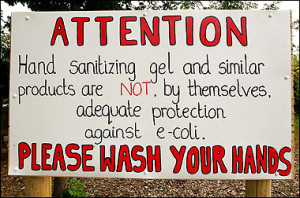Three children have been left with chronic kidney disease after being exposed to E. coli O157 at the east Surrey farm in 2009.
The youngsters were among more than 90 children struck down by the E.coli O157 bacteria after visiting the petting zoo and stroking animals there in August and September 2009.
 All of the children developed haemolytic uremic syndrome (HUS) and three now have chronic kidney disease.
All of the children developed haemolytic uremic syndrome (HUS) and three now have chronic kidney disease.
At London’s High Court on Thursday, Judge Colin Mackay QC said: “These children have all had painful and frightening experiences.
“I cannot think of anything more ghastly than for such young children to go through these procedures.
“However, the outcomes have been remarkable, no doubt due to the courage of the children and their parents.”
“All of the children have a life-long risk – albeit small in some cases – of renal failure in the future, which will require monitoring.”
Eight youngsters needed dialysis after the bug destroyed their red blood cells.
A statement from the parents read: “In the Autumn of 2009, very young children and their families endured for many what was the most frightening and darkest period of their lives following the E. coli O157 outbreak at Godstone Farm.
Of those infected with this strain of E. coli, many went on to develop Hemolytic Uremic Syndrome and suffered acute renal failure as a result.
The weeks that followed were a living nightmare for all. The children were critically ill, frightened and extremely upset by the medical treatment required.
Some of the children have been left with significant damage to both kidneys, high blood pressure and a number of other health related issues.
All of this was caused by a summer’s day out to Godstone Farm. As parents, they did not know enough about E. coli O157 at that time to understand the risks.
“Godstone Farm, on the other hand, should have been aware of the risks that E. coli O157 posed to human health; but in our view, and that of the Griffin Inquiry, they failed to implement the necessary safety measures to protect these children.
During the visit to Godstone Farm, these children washed their hands thoroughly and used antibacterial hand gel. Yet this is a dangerous bacteria, the consequences of which are now all too apparent.
We now know that hand washing cannot be relied upon as a complete safeguard if E coli O157 is present.
The parents would like to thank the amazing medical teams that helped to save their children’s lives and to their wonderful family and friends for their love and support in what are difficult circumstances.”
The children’s lawyers, Field Fisher Waterhouse, revealed outside court that they had so far settled 35 cases arising from the outbreak for a total of more than £1m.
Solicitor Jill Greenfield said: “The horror of what these children and their families have been through is difficult for anyone to describe.
“How do you explain to a scared, young child why they are having to undergo painful treatments? Every parent only ever wants to do the best for the child.
“I can see that a day out to a farm is for many seen as a chance to get back to nature, from the rigours of the city and for children to meet and touch animals.
“But for a day to end like this is utterly devastating.
“What angers parents even more is the fact that the farm remained open over the August bank holiday weekend, at a time when where was a level of knowledge that E.coli O157 was around.
“How tragic that these young children were allowed to skip into this farm completely oblivious to the danger that awaited.”
Best practices for planning events encouraging human-animal interactions
03.Apr.14
Zoonoses and Public Health DOI: 10.1111/zph.12117
G. Erdozain , K. KuKanich , B. Chapman and D. Powell
03.Apr.14
Zoonoses and Public Health
G. Erdozain , K. KuKanich , B. Chapman and D. Powell
http://onlinelibrary.wiley.com/doi/10.1111/zph.12117/abstract?deniedAccess
Educational events encouraging human–animal interaction include the risk of zoonotic disease transmission. ‘It is estimated that 14% of all disease in the USA caused by Campylobacter spp., Cryptosporidium spp., Shiga toxin-producing Escherichia coli (STEC) O157, non-O157 STECs, Listeria monocytogenes, nontyphoidal Salmonella enterica and Yersinia enterocolitica were attributable to animal contact. This article reviews best practices for organizing events where human–animal interactions are encouraged, with the objective of lowering the risk of zoonotic disease transmission.
